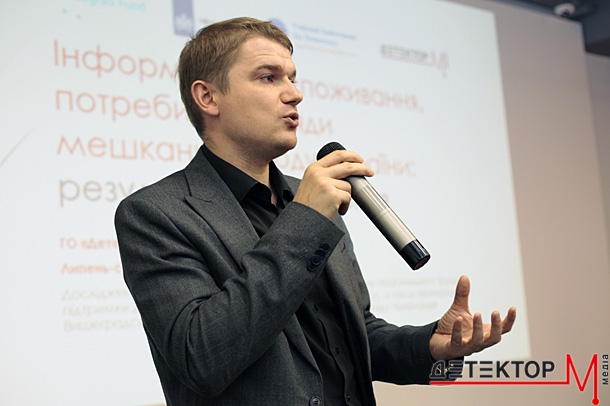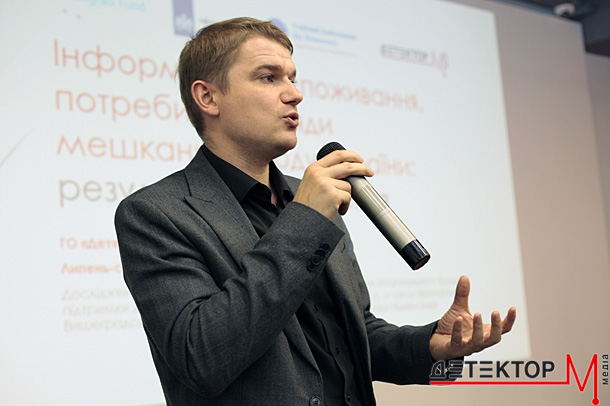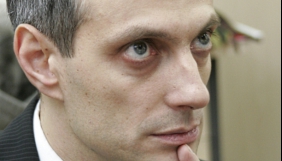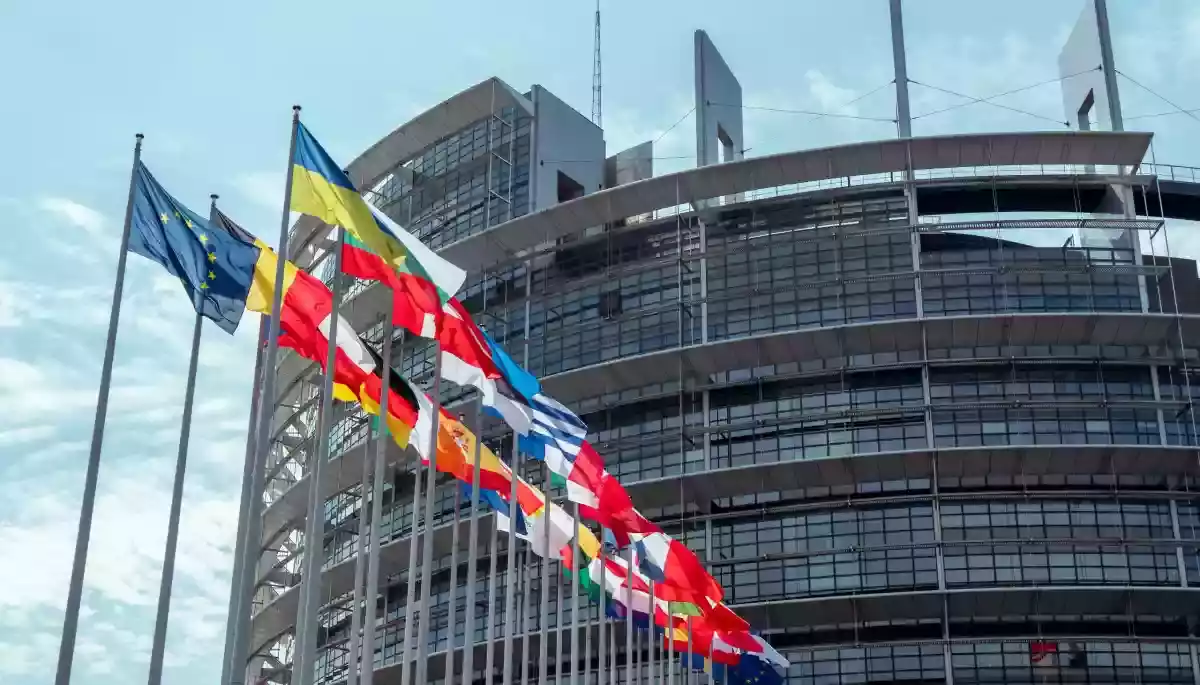
"Ukrainians create an information field that is useful to Moscow", expert on trends in propaganda
"Ukrainians create an information field that is useful to Moscow", expert on trends in propaganda


"From the discussion of fakes and misinformation as such, the world gradually starts to deal with the issue of narratives, which is a much broader and more complex, but closer to the essence of the problem. And, perhaps this year, these changes (at least in the position of colleagues from Central Europe and the Baltic States) have become particularly noticeable", says Roman Shutov, a researcher of Russian propaganda, the head of the research group of NGO Detector Media of the "Kremlin Information Influence Index".
About how propaganda works is already known enough in Ukraine, so now it is time to switch from analysis and monitoring to communication, the expert believes. "There is a need for a dialogue around the topics which are infected with Kremlin manipulations. We must return a common vision of reality, which the Moscow propaganda undermines with its own myths and lies, to the society."
In an interview with MediaSapiens, Roman Shutov tells about the most effective methods of the Kremlin's propaganda, ways to combat them, and explains why Ukraine went further than Western Europe in this sphere.
"Our procrastination allows the Kremlin to do everything
they like in the thoughts of citizens of other countries"
The last three or four years there are a lot of talks about Russian propaganda in Ukraine and in the world. Roman, according to your observations, has the period of getting tired of this topic already started? Is it on the agenda of international organizations?
No, the topic itself remains relevant. Even more than in our country: in our country is spoken a lot on it, but over our western border it is much less.
But the fact that propaganda is discussed does not mean that international organizations are ready to fight it. Yes, this year there were clear declarations from the European Commission and the Council of Europe, but there are too many pro-Russian political currents within these organizations that impede the reaching of concrete actions. The OSCE is actually recusing themselves from the problem; their numerous round tables on the problems of freedom of speech and propaganda already in the times of Dunja Mijatović have turned into a formal chatter, but now the situation got even worse.
At the same time, the topic of propaganda is becoming increasingly important in the work of think-tanks and government structures. NATO Strategic Communications Centre of Excellence in Riga which makes thorough studies of Russian influence in the region has been operating for a long time already. The group of Jakub Kalenský, which monitors propaganda and issues weekly reviews of it, continues to work at the European External Action Service. By the way, a high-level Expert Group on issues of disinformation will be created at the European Commission next year. Good products are offered by the European Values Analytical Center in Prague; the studies by the Slovak GlobSec and by the International Republican Institute (IRI) are also well known.
And does this phenomenon – Russian propaganda – remain really so influential nowadays? What are the main "innovations" used by the Kremlin?
By and large, no one either in Ukraine or in the world has begun to truly counter Russian propaganda yet. Therefore, there are no prerequisites to reduce its impact. On the contrary, our procrastination allows the Kremlin to do everything they want in the opinion of citizens of other countries. We can already observe the sociological consequences of this influence – look at the latest IRI data on the level of pro-Kremlin sympathies in the Visegrád Group countries. Well, it has already been said a lot about what concerns the political aspects – it is Brexit, and the elections in the US, Germany and France.
There not many innovations in the Kremlin's arsenal. The key strategy is to hit the weak spots. And the weak spot is that in modern democracies people no longer feel part of the democratic system. Political parties have become distant from citizens; a political bargain goes around abstract and obscure things; the expression of will once every four years does not give the opportunity to take out the frustration and discontent due to economic problems, etc., and democratic forms of protest have long been devalued. And this is precisely why the Kremlin is armed with populism, xenophobia, skepticism and distrust of everything, primarily of own governments; conspiratorial theories and a lot of pseudo-interpretations of events become useful here. The truth gets lost in this noise, and in fact, nobody needs the truth – people want an emotional discharge, they want to drain their accumulated irritation and fatigue, and the Kremlin understands their needs very well.
In your opinion, can propaganda be changed with another method of Russian hybrid warfare – cyberattacks on the infrastructure of other countries?
I would not use the term "hybrid war" so widely. The cyberattacks became an element of war since they became possible. And the Kremlin already applies them against democratic governments. This is a normal element of reality in the digital age.
Concerning the steps of governments
and the effectiveness of countering propaganda
If you talk about the year that ends, what have been the main trends in countering propaganda you can highlight? What are the differences from previous years?
Little by little, the understanding of the very nature of the threat is changing. From the discussion of fakes and misinformation as such, the world starts to deal with the issue of narratives, which is a much broader and more complex, but closer to the essence of the problem. And, perhaps this year, these changes (at least in the position of colleagues from Central Europe and the Baltic States) have become particularly noticeable.
If earlier our partners engaged in monitoring and research of propaganda phenomena first of all, this year, more attention was paid to study of its consequences and influence on the consciousness of citizens. This has been done by the efforts of Slovakian GlobSec, and of the International Republican Institute (IRI). Although what we mean by the consequences of propaganda, as well as how we see the result of the counteraction – we are only coming to the discussion of these issues.
What about the European countries, where, in your opinion, the influence of Russian propaganda is the greatest? Is it recognized in these countries at the state level?
It is difficult to compare. Firstly, it is because we have very few data at our disposal. The first figures on the influence of propaganda, we have only from Central Europe, and if we talk about Italy, Germany and France – nobody has even started researching it.
Secondly, the "significance" of influence, as for me, depends on the level of goals set by the Russian Federation. In other words, it is whether the Kremlin's influence is sufficient for the realization of their goals in a particular country. If you look at Slovakia, then the number and the activity of influence agent is an order of magnitude lower than in Ukraine. However, the results of their work may turn out to be enough to bring the pro-Russian government to power, which, in fact, is the Kremlin's goal at this stage. As for me, such an influence is more than substantial.
Governments react differently. Mostly, they are not sufficiently capable to realize the threats, and even less they are capable to adopt and implement relevant political decisions. Also note that in Western Europe, in countries such as Italy or Spain, the fact that Russian disinformation is dangerous and that Sputnik with RT are its main channels is not even a subject of general agreement, and only a few journalists or politicians talk about it in public discourse there. There is still hibernation.
Some governments have become more active. There are separate government structures to combat propaganda in the Czech Republic and in Finland. The Czechs conducted a full-fledged audit of national security and already have political decisions to implement its recommendations. This is a very good path, and I would like the other states which set up a system to counter new threats to follow it.
But the problem may be not only in the level of awareness, but also in political will. Hungary and Georgia are fully aware of the threat of Russian propaganda, but there is no political will to change anything. Too strong are ties between their elites and the Kremlin and too much fear of Moscow is present there.
What initiatives and steps of the international institutions are really effective, in your opinion? Although, by the way, measuring the effectiveness of counteraction is probably difficult? Please provide specific examples.
It is not that difficult to measure efficiency; we still do not have a common vision of what exactly should be the result of this work and how we should measure it. This discussion only starts in the expert circles, although it should have taken place long time ago.
I am convinced that we can be satisfied only with one result: lowering level of credibility of the Kremlin's narratives. As an intermediate result could become the fact that citizens cease to use propaganda sources of information and use independent and objective channels. If the result is to be measured by this, then I do not see any truly effective initiative.
But there are very necessary steps without which this result cannot be achieved. This is a study of how people perceive these narratives, and why Russian propaganda is effective. These studies are currently sporadic – these are the mentioned GlobSec, IRI, and ours – of Detector Media – but they allow continuation of the discussion on how we can effectively counter propaganda, on how we can talk with citizens so that they hear us and not the Kremlin.
And what means has already shown, on the contrary, its ineffectiveness?
Well, here, it is impossible to be categorical, especially when there is no obvious evidence of inefficiency. Let's say it like that: it becomes apparent that what is being done is extremely small. For example, monitoring of propaganda influences. It is necessary for us to understand narratives and to make further steps, but in itself (that is, without these further steps) it will not change anything in the heads of millions of citizens. Is fact-checking needed? At the very outset, in order to bring the society out of hibernation, to prove that propaganda is not a paranoid fantasy and threatens everyone – yes, it is needed; but then you need to go for other solutions.
But in any case, communication which does not take into account the specifics of the audience and the addressee is absolutely ineffective. It is communication to nowhere. There are many mistakes here, both in Ukraine and abroad.
About movie production, fake news and new narratives.
Although in our conversation we focus on the efforts of the international community, let's talk a bit about Ukraine. Can you briefly outline the situation with the influence of Russian propaganda on Ukrainian territories? Have any new messages about Ukraine, which have not been traced before, appeared? Have important steps been taken by the state or by the public sector this year to combat Russian propaganda?
If we talk about the territory controlled by the Ukrainian government, then it is difficult to say briefly. Russian propaganda operates on the principle of totality, through a variety of channels and agents: here you have national media, politicians, the church, the Internet, and literature, and pop culture. In our information field, things that are beneficial to the Kremlin are firmly holed up; time after time we discuss topics that are beneficial to them; time after time we doubt the important things that Kremlin wants us to doubt; time after time we feel and spread the emotions that are beneficial for Kremlin among us. And here, it is difficult to understand when it is initiated by Moscow, and when it is our own fault. The propaganda is blending into the patriotic discourse, and it is hard to tell who is the Kremlin's agent for real, and who is just a sincere, useful idiot.
It seems to me that Ukrainians themselves (journalists, politicians, artists, Facebook-bloggers and others) create an information field that is useful to Moscow. And its task is only to observe, support and, if necessary, direct the processes in the right direction.
The state has not invented any new effective means against propaganda. But, on the other hand, precisely because of the actions of the state, we now see a boom of national movie production, and this is an important step to overcome our information dependence on Moscow. Chervonyi, Cyborgs and even The Stronghold are films about the new Ukrainian identity. Identity in the modern world is in principle made through cinema.
If we compare our experience and experience of other countries – what is the main difference?
We went much further than all Western partners, in all respects. It sometimes seems to us that we have too many controversial issues concerning what it is propaganda, what is threatening, and what is not, how to find a balance between security and freedom of speech. But compared to Europe, we have a lot of consensus on these issues. They are still arguing with regard to things that have long been clear to us and which are no longer on the agenda.
Thus, in their focus are still fake news – Fake news as a direct violation of the human right to reliable information. The danger of Russian influence is considered precisely in the context of fakes, which are spread by Russian media and Internet resources. It has long been clear for us that the most threatening are ideas and narratives, and they can be voiced by mainstream media, controlled by pro-Russian financial and political groups, and creating fakes is just the roughest, simplest form of this work.
Our message is as follows: the problem is not in fakes, but in ideas that are increasingly popular with the people and that are incompatible with democracy; in the vulnerability of the media to financial and political influences; in the phobias and frustrations among the citizens manipulated by the Kremlin; in the absence of such a culture of informational consumption, in which the truth and the verity become values. And it is interesting to see how this awareness gradually moves towards the West: if two years ago only Ukrainians spoke about this, this year, these positions have already been shared by the Baltic, Czech, Hungarian and Polish partners.
What, in your opinion, should be in focus during the next year?
We already know enough about how propaganda works. And now we need to finally turn from analysis and monitoring to communication, to interaction with Ukrainian citizens. There is a need for a dialogue around the topics which are infected with Kremlin manipulations. We must return to the society a common vision of reality which the Moscow propaganda undermines with its own myths and lies. Understanding our unity, but not through the slogans "Ukraine is united," but through a deep and sincere understanding of common interests and values. We have to give people confidence in each other and in Ukraine – the confidence that the Kremlin is so actively undermining.
And for this purpose, it is necessary that the critical mass of communicators (government, mass media and public organizations) begin to deliver to people not information noise, but knowledge and understanding. And for this purpose it is needed to have: a) a clear vision of how people nowadays think and perceive information, using what words and in what forms to address them; b) a common understanding of what and how to speak to citizens, and c) a coordination of the efforts of communicators. Communication of the truth about which we and our European partners talk so much must finally become close to the citizens and interesting to them. It should be about people and for people.
In 2017, we have already taken the first steps concerning the first option – we have the first studies of information consumption. Gradually, a circle of institutions which are ready for common communication is formed. But there should be more of them. I would like that next year we talked not only about their synergy, but also about its results for the whole Ukrainian society.















